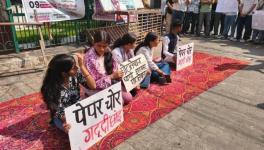Saga of Punjab’s Unemployment – A Sarpanch at Labour Chowk, PhD Scholar for Constable’s Post!
Patiala: Madanpal Singh’s demeanour and attire do not reflect his struggle and disappointment. He is calm, composed but enraged. Singh, a PhD student at Punjabi University, cracked three competitive examinations for government jobs in Punjab, including Elementary Teachers, Primary Teachers, Assistant Professor and, surprisingly, for a constable’s post in Punjab Police. As he speaks in fluent Punjabi, his words unravel the agony of thousands of unemployed young persons in the state who want a decent job for survival.
Talking to NewsClick in the sprawling campus of the university in Patiala, Singh said his journey to being a PhD scholar in one of the most prestigious universities in Punjab was an uphill task. “Hailing from a dalit family in Sangrur, I did everything I could do to fund my studies. I worked as a construction worker and built roads. My brothers and sisters, despite being eligible, are jobless. To my surprise, I passed the qualifying examination for recruitment as constable in Punjab Police but I did not appear for the physical test. An utter sense of shame overwhelmed me that despite being a PhD scholar, I am appearing for this job! Today, I am jobless,” he said.
The joblessness of eligible aspirants for government jobs is rooted in stuck appointments and cases awaiting hearings in courts. The aspirants maintain that the job crisis in government sector should be seen in connection with rampant corruption and inefficient bureaucracy, which could not issue a draft notification ensuring impartial recruitment without any technical error. Punjab currently has 1.30 lakh vacancies in government jobs, with highest number of vacancies in the education department with 19,300 posts, followed by police and health departments.
To begin with, the state government issued a notification for recruitment of assistant professors in government colleges after a gap of 23 years in October 2021 for 1,158 posts, which attracted several applications. The selection criteria maintained that the candidates should have qualified the National Eligibility Test conducted by University Grants Commission. Additionally, the candidates with experience of teaching in government colleges would be given additional one mark for each year of experience up to five marks.
The latter provision was objected to by many aspirants who did not have any experience of teaching. The aspirants maintain that the contentious provision was brought to notice of the grievance committee and a corrigendum was requested. However, the committee asked the candidates to seek intervention of the High Court. The case is listed for February 17 in Punjab and Haryana High Court now.
Job aspirants are also questioning the arbitrary conduct of state universities in implementing the reservation norms for girls. The state’s reservation policy makes it mandatory for institutions to reserve 25% seats for Scheduled Castes, 12% for Other Backward Classes and 33% for girl candidates. Even if the girls come from SC/OBC background, the general precedent is that they will be given reservation benefits on the basis of gender only. While Punjabi University, Patiala, followed the prescribed method, Guru Nanak Dev University reserved the seats on both grounds. This conduct was also challenged in the Punjab and Haryana High Court.
Singh is researching on the work of British author and anthropologist Richard Carnac Temple, who is credited for devising efficient methods in ruling India by opting local traditions and folklore. Temple once famously said: “The practices and beliefs included under the general head of Folk-lore make up the daily life of the natives of our great dependency, control their feelings, and underlie many of their actions. We foreigners cannot hope to understand them rightly unless we deeply study them, and it must be remembered that close acquaintance and a right understanding begets sympathy, and sympathy begets good government.”
Talking about unemployment not being on the agenda of political parties, Singh said that the state was losing much of its talent and workforce to legal and illegal migration to Western countries only because it had failed to produce enough job opportunities.
“I qualified for assistant professor’s post too but I have no job because the officials here could not make the process error free. Those who have resources, such as land, sell a portion of it and migrate to Canada, Australia, New Zealand and the US. But landless people like me, cannot migrate. The agrarian sector is already in distress and is no longer profitable. Industries have moved out of the state. So, it’s a delicate situation. Officials do not understand our struggle. We are disappointed to the extent that sometimes suicide appears as the sole option. I spent years in preparations but no hope is in sight now,” Singh added.
Commenting on the upcoming Assembly elections and absence of unemployment as an issue in the campaign of political parties, Singh said: “It appears like a wrestling match. If people are voting in elections, why are their issues and problems not discussed? Their statements clearly reflect they are no longer interested in our problems now.”
Punjab goes to vote on February 20.
Karamjit Singh, another PhD scholar in economics told NewsClick that families of the selected job aspirants were in trauma when they heard that the recruitment was challenged in the High Court. “When we talk about unemployment, the state is well placed above the national average of 6. Punjab has 8% unemployment rate. As far as struggle is concerned, I have been preparing for a slew of tests for the past seven years. Finally, I got through the assistant professor’s test for which vacancies were advertised after 23 years. Now, I live far from family in Bathinda. They have been arranging money for me and even though they witness financial distress, they never express it to me,” he said.
A look at the reports in the regional newspapers suggests that the recruitment drive of assistant professors was not the only one to have faced legal hurdles. Punjab had to abandon drives for recruitment of elementary teachers and sub-inspector posts owing to irregularities and corruption. Moreover, the drive to recruit Patwari Jail Warden and other posts are stuck after the code of conduct came into action.
Reports suggests that 1.31 lakh students in the state have shifted from private schools to government schools in previous academic year alone owing to loss in income of parents.
Ravindra Pal Singh, who successfully passed the Elementary Teachers Training test for state government schools which desperately needs them in the post-coronavirus period. He said the recruitment drive was cancelled by the High Court after it found that the notification was replete with errors and did not comply with established rules.
The Punjab government had advertised 2,364 posts for elementary teachers to be posted in border areas. However, the advertisement stated that the candidates with higher qualification would be given extra marks. Additionally, the government introduced extra marks for experience too. While the High Court acknowledged that the quashing of posts would cost hardships to aspirants, it could not allow illegality. In its observation, the HC said the government did not form a board to make its recommendations but made the Director (Recruitment) the sole authority to decide on the conditions.
Singh, however, maintained that the aspirants were paying a hefty price with years of preparations going down the drain. “The people who prepared for years just could not accept the fact that the recruitment drive was cancelled. They slipped into depression,” he added.
Labour Chowk Scene
To understand the impact of joblessness, NewsClick travelled to Labour Chowk at Urban Estate area in Patiala. Daily wage workers there said that the average availability of work was usually between 10-15 days a month making it extremely difficult to survive.
Hari Shankar Yadav, who migrated to the state in search of work from Bihar’s Sitamarhi, said he had nothing to eat if he doesn’t find work for the day. His contractor has still not paid him for previous work. “We came to Punjab because wages here are higher but finding work every day is a challenge. It has been raining for a few days. So, there is no work,” he told NewsClick.
So dire is the situation that NewsClick met a sarpanch of a nearby village who had come to the Chowk in search of work. Requesting anonymity, the sarpanch said he came in search of work because of acute distress in his village.
“I have been chosen as sarpanch by a unanimous decision of other members. The elected sarpanch was found guilty of forging caste certificate and he was sacked by the court. I could not find work in the village. So, I have come here in search of work for few days now.”
22 Lakh Unemployed in Punjab
An analysis of data furnished by the Centre for Monitoring Indian Economy suggests that the unemployment rate in the state is 9%, well above national average of 6.7%. Talking to NewsClick, R S Ghumman, Professor of Economics at Centre for Research in Rural and Industrial Development (CRRID) in Chandigarh, said as per his estimates, the state has 22 lakh unemployed persons who are constantly looking for jobs.
“When we discuss unemployment in Punjab, it should be clear to us that the development rate of the state has been consistently lower in comparison with the national average for the past 30 years. Underdevelopment has pushed youth to think about other options, including migration to Western and Gulf countries. We are losing 1.5 lakh youth every year to migration. Coupled with this, there is hardly any investment in the public and private sector. Industries have died in absence of support,” he said.
Explaining why this happened, Ghumman said: “Our study suggests that the state is losing Rs 20,000 crore to Rs 25,000 crore per annum primarily because of leakages caused by corruption and other factors. Political parties across the board are more interested in giving freebies and this is hurting the state deeply. Corruption has reached all-time high, from sarpanch to top most positions in ministries. This is evident in affidavits furnished by leaders to the election commission that they prospered at cost of state.”
When asked about agrarian distress adding to unemployment, Ghumman said: “The Punjab government asked three state universities to conduct a study about the crisis. The study found that 16,606 farmers and agriculture workers committed suicide owing to indebtedness till 2016 in a span of 16 years. I think 5,000 more farmers have committed suicide in the previous five years. The fact remains that agriculture offers work for only three months in a year. The diminishing returns are making it untenable to continue now, giving further push to unemployment,” he added.
Get the latest reports & analysis with people's perspective on Protests, movements & deep analytical videos, discussions of the current affairs in your Telegram app. Subscribe to NewsClick's Telegram channel & get Real-Time updates on stories, as they get published on our website.
























